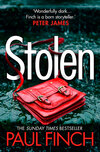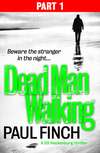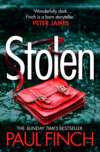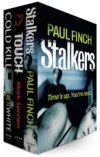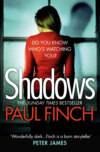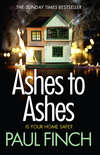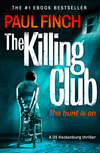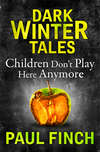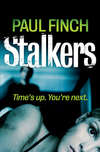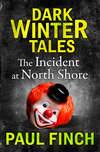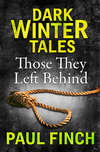Kitabı oku: «Stolen», sayfa 7
‘Right … you all know what you’re doing.’ Beardmore reached forward to switch off his laptop. ‘If you need me, get on the blower.’
‘Oh, boss …?’ Lucy said.
‘Yeah?’
‘Can we copy Serious Crimes Division in?’
Beardmore sat back, looking suspicious. ‘Why?’
‘I don’t know …’ She shrugged. ‘But I’m hearing second-hand that some homeless people have dropped out of sight recently.’
Beardmore pondered this. ‘Pensioner age?’
‘They’re older people, certainly. And two different sources have now drawn my attention to it.’
‘Any suggestion these mis-pers have been abducted?’
‘I don’t know about that. I’ve not looked into it yet.’
There was a long pause while he considered it.
Lucy had already mentioned the vehicle at the back of Harry Hopkins’s house, but she’d purposely said nothing about a black van. In truth, the thought had occurred to her immediately on hearing about the screeching tyres, but, on reflection, it was a real stretch. Firstly, no evidence had been found that any such vehicle existed. From the outset, the black van had been more legend than fact. They’d gone after Les Mahoney through intel received by the RSPCA. It had seemed possible at the time that there was a connection with this rumoured black van, but it wasn’t the van, or any vehicle in particular, that had led them to his farm. Secondly, even if the black van was real, dog-napping didn’t easily equate to kidnapping. Where was the actual link between the two?
‘Copy Serious in if you want to,’ Beardmore said, interrupting her thoughts. ‘But be careful how you word it. Tell them this whole thing is open-ended as yet, and we’re only marking their card. Underline that we’ve observed nothing thus far to make us suspect that a series of abductions is under way.’
Lucy nodded and Beardmore leaned forward again and cut the call.
Banks stood up. ‘Big difference in MO, that, Luce. Grabbing someone from off the streets and grabbing someone from their own back door.’
‘I know …’ Lucy was equally uncomfortable with it. ‘Hunch, sixth sense, whatever you want to call it.’
‘Well, don’t beat yourself up too much.’ Banks headed back to her own desk. ‘Hunch and sixth sense have caught killers in the past.’
Killers, Lucy thought.
She wouldn’t have used that word herself. Not yet. But there was something disconcerting about all this, and the weirdness didn’t reduce it to merely silly. Despite the arrests at Wellspring Lane, over twenty dog-napping cases were still wide open, along with rumours that a late-night vehicle had been prowling the housing estates where they’d disappeared. And now they had people disappearing as well, and yet another late-night vehicle was possibly involved in that.
It was like an urban myth coming slowly to life right on their doorstep.
But no, no … she resisted that idea strenuously.
They only had fragments of information, none of which necessarily married up. This whole thing could still turn out to be nothing. And the only way they could make firm judgements on that was if they started gathering and collating some real evidence.
No. 8, Atkinson Row and the backstreet behind it were now officially designated crime scenes. The first CSIs would be there later today. That could only help. In addition, there were witness statements to be taken. As soon as Tessa Payne checked in, Lucy would send her to speak to the Rodwells – because she herself had someone else she needed to speak to, and that would be far from straightforward. If she wanted to learn more about these alleged missing homeless, to try and work out whether they actually had disappeared, rather than left the area of their own volition, the only thing to do was go and talk to the homeless themselves.
Or at least to their spokesperson.
‘Sister Cassie,’ she muttered, taking a Greater Manchester A-Z from the drawer in her desk and flipping to the page on which a street map of Crowley, and the St Clement’s ward especially, were displayed. ‘Where on earth do I find you today?’
Chapter 9
It was quarter to ten on a Saturday night, and like every night Lorna Cunningham hit the pavements running in her hi-tech Ultraboost trainers and pink and green running vest and tights.
Her friends, even fellow exercise freaks, were always amazed when they learned that she went out for a run on Saturdays too.
‘Seriously, babes?’
‘You owe yourself some downtime.’
‘You need to live a little bit, at least.’
Lorna smiled to herself as she lolloped across the housing estate. It wasn’t a graceful running style, but she had long, lean limbs and she covered the ground quickly and effortlessly. Fitness was a big thing these days, but so many people played at it. Not Lorna. She was the real deal, getting herself into shape so that she could compete, denying herself chocolate, cakes and nights on the town so that she could bring her best game to the running track and the volleyball court. So that she could win. But that required mental strength as well as physical, which was exactly what she was demonstrating now: sticking rigidly to her routine, coming outside and putting herself through it on club night.
Even Alex, her boyfriend of several years and a three-times Ironman competitor, was fascinated by the discipline this required. Not that he was hugely supportive, though that was more out of concern about the lateness of the hour and the quietness of the streets.
Lorna simply told him not to worry. It was true: unless you were in the very centre of town, Crowley was usually quiet on a Saturday evening. The few cars on the roads were taxis and minicabs and there were almost no pedestrians. In his eyes that made it dangerous for her to be out alone, but Lorna always argued the opposite. Anyone of a thuggish inclination would probably be down in the bar and nightclub district, where they would find more than enough violent action.
However, Alex’s unease had transferred itself to Lorna a little. He wasn’t being overly protective; she knew there was some sense in his words of caution. A woman jogging solo after dark … well, you couldn’t be too careful, could you, whatever night it was? Which was why, over the previous year, she’d devised this particular route and now followed it religiously. The first part, which she’d almost completed, led mainly through middle-class housing estates, where it seemed unlikely there’d be anyone hanging around looking for trouble. After that, she’d be out of sight completely, so there’d be no one at all to bother her – and she was almost at that point now.
Her breathing steadied, her pace increasing, as she circled around the top end of Queen Alexandra Park and joined Leatherton Lane. This was one of the busier roads in Lorna’s part of town, but even here only a single vehicle flitted past, a blue transit van, its two occupants paying noticeable attention to her, though that was no surprise. Lorna had a tall, coltish figure but was freckled and pretty, her copper-red hair cut in a fetching pageboy bob.
It didn’t matter anyway, because she now diverted from the pavement, vanishing into a passage between two maisonettes. It was an unlit cut-through, which, once it passed the back of the maisonettes and their rear gardens, sloped downward for fifty yards before joining the towpath on the north side of the Bridgewater Canal. Still sticking to her normal route, Lorna followed the towpath east, lengthening her stride alongside the night-black water, her feet thudding on the dry cinders. It was quite dark along here, the only light filtering down from streetlamps on bridges or over the tops of factory walls, but she had come this way so often in the last few months that she felt she could have run it blindfolded.
Some of her friends thought that she was extra-brave for coming this way. This was possibly the quietest stretch of the canal, with no residences, no houses or narrowboats. If pressed on the matter, Lorna supposed that, yes, it would be an ideal place for some weirdo to launch an ambush. But firstly, why would some predatory individual hang about down here, where he wouldn’t expect to find anyone? And secondly, she had faith in her physical abilities. She was now two miles into the run and still travelling at a pace well above jogging speed. She might be hot and sweaty, moisture pooling on her brow, but she had plenty of energy left. Her lungs were going like the clappers, her hamstrings and the backs of her calves steadily tightening, but she was fit, and actual fatigue was still far away – she could keep going for hours yet and was certain that she could easily outrun the average person.
She’d just reached the Navigation Lock, however, where the gaunt shell of a pub stood on the other side of the water, its windows boarded, when she suddenly sensed that there was someone else on the towpath. She glanced behind her and was just able to distinguish a diminutive shape some fifty yards away. Disconcerted, she glanced back again, this time for longer, trying to get a proper view of whoever it was.
The shape passed through a patch of streetlighting, and Lorna glimpsed a slim, girlish figure in a pale-grey tracksuit, wearing what looked like white trainers, with a mop of light blonde hair.
She ran on, uncertain why she still wasn’t happy. Almost unconsciously, she increased her speed a little, legs now pumping, lungs working furiously, until she was moving at what felt like a half-sprint. That wasn’t really a good idea. She still had about three miles to go, and if she kept this up she’d be exhausted long before she reached that target. She decelerated again, glancing over her shoulder a third time.
Inevitably, the figure had fallen behind a few yards and was in dimness again, so it was difficult to identify anything about her aside from her sex. That alone should have made her presence less threatening, but Lorna still couldn’t help thinking it odd that the other runner had come upon her seemingly from nowhere. Of course, that made it sound more sinister than it possibly was. The girl or woman might have been jogging along the canalside anyway, Lorna coming down the cut-through from Leatherton Lane just ahead of her. There was no reason why it couldn’t be as innocent as that. But again, at the risk of thinking like Alex, it was late, the towpath was dark and that other runner was a lone female.
Lorna had assumed that only she was bold enough to take a route like this so late at night.
She glanced behind one final time. The other runner had fallen a significant distance behind. It wouldn’t be long before she was out of sight altogether.
Now, several hundred yards past the pub, the wall on Lorna’s left gave way to rusted wrought-iron fencing and, on the other side of that, flat open ground. She knew from having run this way earlier in the year, when the evenings were lighter, that it was mostly allotments over that way; the terraced houses to which they belonged were still visible about three hundred yards distant, but only in outline. A little past the allotments, the fencing ended and the garages began. There were six of them, a terraced row, all backing onto the towpath, all disused. They were decades old and built from cheap wood: flimsy, teetering structures, their sagging tarpaper roofs ready to fall in.
Lorna passed them by without a second glance, driving relentlessly forward, her breathing more ragged now, but her feet still pounding the cinders. Further iron fencing appeared on her left. Whatever lay behind that was lost in total darkness. Then, from somewhere not too far behind, there came a sharp cry of pain.
Lorna glanced backward again, once and then twice, the second time looking for longer, trying to focus through the dimness.
The second runner, the woman or girl, appeared to have fallen, and now rolled about on the path alongside the fourth of the garages, both hands gripping her left knee.
Lorna continued forward, determined not to be distracted from her schedule, though already her heart was sinking because almost immediately she’d realised that she was going to have to go back. She was a civilised being, after all; you couldn’t just ignore it when someone had an accident. She tromped on along the towpath for a dozen or so yards, glancing backward again and again, hoping against hope that the diminishing figure would be getting back to its feet. But increasingly difficult though it was to see, it looked as if the woman, whoever she was, was still on the ground.
With no other option, Lorna slowed to a halt, turned and, with shoulders heaving, trudged back along the path.
‘You all right?’ she asked, as she approached the fallen shape.
‘I’m so sorry,’ the girl whimpered, sitting upright on the path but still clutching her knee. In the half-dark, it was difficult to be sure, but she sounded young, no more than a teenager. ‘I don’t know what I’ve done.’
‘What happened?’
‘I don’t know … I’m just glad you came back. I didn’t want to be stuck here on my own.’
‘Let’s have a look.’ Still breathing hard, fresh sweat glinting off her arms and shoulders, Lorna knelt down to make a quick examination. ‘If you can just roll up your—’
The girl stuck her in the bicep with a syringe.
‘Hey!’ Lorna jerked backward. ‘What the hell do you …?’
Instantly, she lost focus, the towpath seeming to tilt, her words slurring. When the girl reached up and grabbed her by the wrists, she resisted as much as she could, struggling as they grappled with each other, trying to roll back onto her heels and push herself away – but suddenly Lorna couldn’t maintain even that minor effort. Within moments, all strength and coordination had left her. She slumped sideways onto the cinders, while the girl got hurriedly to her feet, panting. A deep, sluggish cold now surged the length of the athlete’s body. She was only vaguely aware of the rough ground against her cheek, her blurring vision fixed across the water on the towering brick structure of a mill, which overlooked the scene of her defeat with broken, empty windows.
Then a thunderous impact sounded on the other side of the back wall of the fourth garage. Lorna watched from the corner of her eye, unable to make sense of it as the rotted timbers broke apart, a sledgehammer’s head appearing, and then a heavy-booted foot kicking savagely and repeatedly at the lower planks until they too were smashed. By the time a dark-clad shape had fought its way through, Lorna’s eyes were fluttering closed. As her vision faded completely, two pairs of hands gripped her and turned her roughly onto her face. The last thing she knew, her wrists were folded across each other in the small of her back, and a tight plastic cord bit into them.
Chapter 10
Crowley, like so many parts of Greater Manchester, had once been heavily industrialised. In its heyday, it boasted coal mines, textile mills, rail sidings for heavy goods, and endless traffic on its canals. But those days had passed. The flywheels on its pit-heads were gone, and though its skyline was studded with tall chimneys, none of them smoked any more. Most of its factories had stood empty for years: towering red-brick edifices filled with dirt, dust and silence, decayed symbols of a formerly proud heritage, totemic reminders that municipal prosperity could come and go in the blink of an eye.
One part of Crowley where many of these defunct landmarks could still be found was the St Clement’s ward. Here, ten or twelve former industrial premises stood close together, forming a miniature ghost-town within the overall fabric of the real town. All were long disused, separated from each other by narrow, rubble-strewn lanes that no longer led anywhere, and mostly fenced off to prevent public access, though in many cases the fences themselves were so old that they too had collapsed. They now provided an unofficial refuge for the homeless, especially as a concerted effort was due in the next month to start clearing the town centre’s doorways and side passages of vagrants.
When Lucy drove over to St Clement’s, it was later than she’d intended, just after ten o’clock at night, mainly because completing the paperwork on the sixty-plus arrests made at Wellspring Lane had severely tested both her and her keyboard’s durability. But she didn’t think the lateness would be much of a problem. St Clement’s could be scary at night but going into dark and threatening places was the police officer’s lot.
She parked on a cul-de-sac just off St Clement’s Avenue, in front of a row of six terraced houses now boarded up and marked for demolition. Walking to the end of the short road, which no longer had a name of its own, she stopped and listened. Hearing nothing, she headed south along St Clement’s Avenue, following a rickety fence of corrugated metal. Some two hundred yards later, the fencing gave out, entire sections having fallen and been trampled. On the other side, two monoliths of rotted brick reared, vast and ghostly, into the night sky: Penrose Mill and its sister carbuncle, the old Griggs Warehouse. The ground in front of them was open and littered with every kind of refuse, and normally at night would be pockmarked by small fires burning with greasy reddish flames, the dark, tattered shapes of homeless folk clustered around them. Lucy especially expected this in the current warm, dry spell: the town’s forgotten people enjoying the balmy night rather than huddling beneath broken stoops or crammed into sewer pipes and burned-out cellars.
But at present there was no one. Not a soul in sight. Which was strange and not a little eerie. It was also inconvenient, as the only way to find the ex-nun would be by asking someone where she was.
Lucy walked forward warily. She’d consciously dressed down for this, putting on jeans, training shoes, an old hoodie and a denim jacket. This wasn’t simply so that she could blend in with the crowd, but to make it look as if she wouldn’t be worth robbing. There’d be many unfortunates here, men and women who through no fault of their own had fallen through the cracks of society, but there’d be addicts too, alcoholics and mentally unstable characters who could turn violent in an instant. That was also why she had an expandable Autolock baton in a special scabbard sewn inside her jacket, a small can of CS spray in one back pocket, and her handcuffs in the other.
At the moment, though, it looked as if she wouldn’t need any of them.
The place was deserted.
She walked on, increasingly puzzled, coming to a derelict railway line so tangled in thorns that she half tripped over it. She followed this into a canyon between the soaring outlines of the two main structures. Concrete platforms now stood on either side, and Lucy climbed onto the one on her left. It was scattered with bottles, cans, food cartons and wastepaper – yet more indications that folk had been living here and probably still were. She glanced behind continually as she ventured along it, still seeing no one, though when she looked left through the various apertures into the warehouse proper – tall, glassless window frames, or even larger gaps where loading-bay doors stood partly open – it was easy to imagine furtive movement in the darkness. She was tempted to shout, to simply call Sister Cassie by her name, but Lucy didn’t think she’d like the way her voice would echo through the labyrinthine concrete.
She pressed on, holding back from switching on her Maglite, as that would indicate that she might be worth attacking after all. Besides, dim but adequate starlight from the narrow strip of sky above showed that she was approaching the end of the platform. A crumbling mass of half-collapsed brickwork was all that remained of the wall in front of her. On her right, down in the pit, she saw railway buffers peeking through the dense, rancid foliage. On her left, an entrance gaped, a corridor of sorts, which appeared to lead into the very guts of the warehouse. She glanced back along the platform to her rear, just to ensure that hostile forces weren’t encroaching from behind.
It wasn’t easy to be sure. Beyond a couple of dozen yards, the dimness obscured much, allowing for optical illusions. What appeared to be someone crawling towards her on all fours, and freezing on the spot when she looked, gradually resolved itself into a crumpled heap of cardboard.
She glanced back into the passage on her left. If it had ever had a door, it was long gone, but it seemed to offer a direct thoroughfare from one side of the building to the other. That was the obvious way to go next, though Lucy wasn’t convinced that it would be sensible. It wasn’t as if she was anticipating trouble – if so, she’d have called for support. The problem here seemed to be that the place was empty. For all that this dark, decayed environment was menacing, she was sure that no one back at the nick would think any less of her if she delayed this thing until daylight tomorrow.
But that was assuming she’d be able to find the time tomorrow, which she wasn’t certain about. Also, she wanted to make progress quickly. Lucy didn’t like knocking things on the head before she’d even tried, and the suspicion that she might be onto something with these so-called disappearances would not go away. She needed answers of some sort, and she needed them promptly.
She stepped forward into the passage and found herself stumbling over broken planks and littered, tattered newspapers, her nostrils filling with a stench like stagnant urine. She became aware that she was passing more entrances, both left and right. It was now so dark that she was forced to switch on her Maglite and shine it through every doorway. In the first she thought she saw a pale face peeking over the top of a mouldy old quilt, only to realise that it was a roundish patch of malodorous fungus on the wall behind. In all the rooms after that, she saw only rusted pipework and bare, moss-covered bricks.
She glanced repeatedly over her shoulder as she proceeded, the rectangle of dimness that was the entry to this passage steadily receding. Another twenty yards further on, she came to a point where the roof and left side of the corridor had collapsed, forming a landslip of rubble on one side. She was shocked – gut-punch shocked – to see a featureless figure perched on top in an apelike crouch.
‘I’m … I’m looking for Sister Cassiopeia,’ she said, thinking it wise not to shine her light up there.
‘Good luck,’ came a whispered response.
Still watching the figure, Lucy pressed on, clambering over fallen bricks and masonry, and now seeing a glint of moonlight ahead. Relieved, she came to a hanging steel door. It was already partly open and screeched the rest of the way when she pushed. It brought her out into another passage, transverse to the one she’d just come through, and much broader. It had a slanted ceiling made from glass panels, though all of these had collapsed, leaving flaking metal frames and jagged fragments. This side of the warehouse caught the moonlight squarely, leaving it bathed in a spectral luminescence, which at least meant that she could switch her torch off and conserve the battery. The wooden wall on the right no longer existed, having been burned, leaving only a charred framework, which made the passage feel more like an arcade. She walked along it a good sixty yards or so, but there was never much to see: more moonlit ruins, more roads to nowhere, more weedy plots of ground.
Then she thought she heard something; the screech of a metal door being forced. She glanced back along the arcade, thinking that she would easily see someone approaching her from behind. The passage had curved, however, so that the last noisy door she had come through was out of sight. Of course, if someone was following her – she couldn’t help thinking about that crouching, apelike figure – it wasn’t necessarily the best idea to hang around and meet them.
She decided to head back now. This had clearly been a futile errand. She had other work to attend to anyway and would simply put out a BOLO, or ‘Be on the Lookout’, for Sister Cassiopeia. A steel-framed doorway a few yards away looked most promising. When she glanced through it, she saw another brick corridor, but with light at the far end. However, she was no more than five yards inside when she realised that a dark figure was coming down it towards her. It came quickly but awkwardly, moving with a horrible seesawing gait; the closer it got, the more of the light at the end it blotted out.
Lucy backed stiffly into the moonlight, thinking that if someone was behind her as well, she might be cut off. Her hands slid under her jacket, fingers caressing the hilt of the baton. She could now hear whoever this was; feet clumping, damp material whisking over bricks and concrete. Before she knew it, she’d retreated to the other side of the arcade. Where once there’d been a timber wall, now there was a drop of seven or eight feet onto heaps of burned, mangled rubbish. Her heels were right on the edge, and she was tottering.
She stopped, risked a glance behind, and then looked back across the arcade – just as a voluminous shape, cowled and cloaked in black, ballooned into sight.
Lucy half-sagged with relief.
Sister Cassie briefly managed to look even more ghostlike than usual, hobbling forward through the moonlight rather than gliding gracefully as she usually did. Consternation was written on her face.
‘Lucy, Lucy,’ she said admonishingly. ‘I’d heard you’d come here looking for me. For Heaven’s sake, child, whatever possessed you to come into this place on your own?’
Lucy released the baton back into its pouch. ‘I told you I’d come and find you.’
‘Yes, but this dreadful place isn’t safe for a girl like you. Not at night.’
‘Sister … I’m a police officer.’
‘And that’s something else that worries me.’ The ex-nun tut-tutted, eyeing her up and down. ‘A child like you … in a job like this.’
‘Sister …’ Lucy suppressed her irritation. ‘Your concern is appreciated. But if it’s safe enough for you …’
‘Ahhh, no.’ Sister Cassie wagged a finger. ‘I have an advantage you lack. I commune with the Lord daily. Matins at midnight, Lauds at dawn, Prime at breakfast, Terce in the morning, Sext at Midday, None at mid-afternoon, Vespers in the evening … Compline before bed. I enjoy His full protection.’
‘And what does He feel about your heroin habit? Or the tricks you turn?’
Sister Cassie shook her head with an air of disappointment. ‘You try to express concern for your fellow creatures …’ She turned and limped haughtily along the arcade. ‘It’s our Christian duty to survive, Lucy. Any way we can.’
Lucy fell into step alongside her. ‘Survive? On heroin?’
‘At present, I can’t shake the need. But at least I can suppress it.’
‘Or feed it.’
‘Call it what you will. My medicine enables me to look after my regulars.’
‘What about Fred Holborn? Was he one of your regulars?’
‘Poor Fred.’ Sister Cassie sounded sad but kept on walking, or rather limping. ‘He had an appetite for the carnal pleasures, but at heart he was decent. A ship’s mate in his youth, I believe. Past seventy now. How fallen are the mighty?’
‘Sister, I know you’ve reported Fred Holborn missing. But are you quite sure something bad has happened to him?’
‘It certainly looked bad.’
‘Looked bad?’ Lucy turned, grabbing her shoulder, stopping her in her tracks. ‘Sister, did you see something?’
‘Why yes.’ The ex-nun seemed surprised. ‘Did I neglect to mention it?’
‘I’m not sure … I had my mind on other things. But tell me now.’
‘It was here. This very place.’ She veered to the left and a jagged portion of outer wall that hadn’t burned away. At its base, sheets of brown-stained newspaper covered an old mattress. ‘This was where Fred preferred to sleep.’
‘So tell me what happened,’ Lucy said.
‘Well, I was making my nightly rounds.’ Fleetingly, Sister Cassie sounded disapproving. ‘I had considered cutting Fred off my roster because of his lewd behaviour. But …’ She sighed. ‘One mustn’t exaggerate. They were suggestions, not actions. In short, well, to be frank, on one occasion he asked me to—’
‘Sister, I’m not worried about that … just tell me what happened to him. And when.’
‘It was … I’d say a week and a half ago.’
‘As recently as that?’
‘Well, yes. That’s why I remember it so well. It was nine o’clock in the evening. I’d come along to tuck him in, keep him company for a while. I’d managed to scavenge half a pizza which some lout had left on a wall outside an Italian takeaway. A whole half-pizza. I’d already distributed some of it, and there were only a couple of pieces left. I’d made an effort to save one for Fred, though. He’s skin and bone, these days, the poor man. Not that this has tamed his lusty conversation. Oh, dear me, no … some of his comments would even shock a police officer—’
‘I’m sure,’ Lucy cut in. ‘Just tell me what happened.’
The ex-nun pursed her lips. ‘On this occasion, it was a little too much. Especially after I’d saved him a whole slice of pizza. I told him that I was offended. I gave him the whole flask of tea I’d intended to share with him but said that I wasn’t staying with him a moment longer. I was halfway down this path here …’
She moved further along the arcade, coming to a point where a hole had been kicked in the remaining scorched planking. On the other side, rough ground sloped up to the edge of the concrete. A well-trodden footpath snaked down it, cutting through dense weeds near the bottom, before joining another derelict cobbled access road.
Ücretsiz ön izlemeyi tamamladınız.
